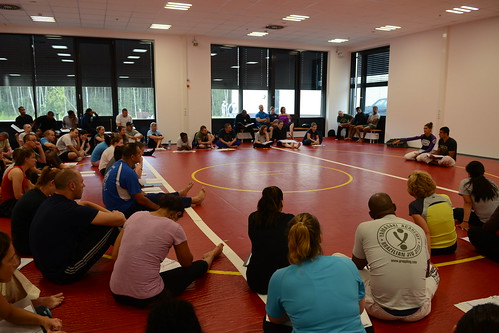
Source: Flickr
Connoisseurs of spicy food know all about the cayenne pepper. The little red pepper packs a fiery punch and adds four-alarm zip to everything from stir-fry to Creole sauce – and it can save your life.
A Modern Twist on an Ancient Technique
Cayenne pepper, also known scientifically as oleoresin capsicum (OR), is the main ingredient in most commercially available pepper sprays. Cayenne has been used for thousands of years as a method of self-defense. Armies in ancient China wrapped ground, dried cayenne pepper in rice paper and threw it at the faces of their opponents to stun them. Around the same time, the Japanese invented a little box used to blow cayenne into the face of an enemy.
Today’s pepper spray was originally developed in the 1960s as an animal repellent. It was a big hit among mail carriers who had to contend with unfriendly neighborhood dogs. Portable and easy to use, it has become one of the most popular forms of personal self-defense.
Spicing up Self Defense
If you’ve ever felt the burn of spicy food on your tongue, you can probably imagine why pepper spray is so effective. Pepper spray is far more concentrated than your typical spicy dish, and when aimed at the eyes and face of an attacker it produces a number of unpleasant effects:
• Difficulty breathing
• Intense eye irritation
• Temporary blindness or inability to open the eyes
• A painful burning sensation on the skin
• Coughing and runny nose
These effects are temporary – some last about 30-45 minutes. But the skilled use of pepper spray can buy you enough time to get out of a dangerous situation and call for help. Pepper spray is an effective, non-lethal way to protect yourself from a would-be attacker.
Pepper sprays are available in a variety of forms, including many that are small enough to fit inside a handbag or pocket. Whether you choose a large spray canister or a lipstick-sized spray that fits on a key ring, it’s important that you use pepper spray responsibly and follow some basic guidelines:
• Check with your state laws regarding pepper spray. Some states only allow certain sizes and concentrations, and some states prohibit Internet sales of pepper spray – know the rules before you make a purchase.
• Keep your pepper spray in the same place at all times. You should be able to access your pepper spray as soon as you need it – in a dangerous situation, you don’t have time to dig through your purse to find it.
• Test your pepper spray periodically. It’s a good idea to (carefully) test out your pepper spray to make sure it still works. It’s also good practice so you know how to use it if you need to.
• Keep pepper spray out of the reach of children. Although it’s not lethal, pepper spray can be painful. Don’t leave it where your kids can play with it.
